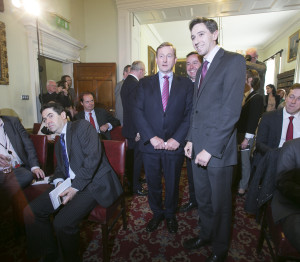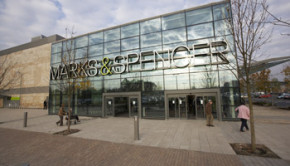State of play

With the economy finally beginning to show signs of improvement, what will be the implications of these green shoots for retailers in the coming year? Gillian Hamill speaks to Minister of State Simon Harris, the youngest member of the 31st Dáil, about the government’s Action Plan for Jobs, credit availability and legislation surrounding the sale of tobacco
11 February 2015
At a glance: Government goals
Employment: Full employment by 2018
Regional development: IDA Ireland has been charged with implementing a regional job creation strategy
Credit accessibility: The Strategic Banking Corporation of Ireland (SBCI) has been established on the basis that it will provide credit to SMEs
Plain packaging: Minister Harris is in favour of introducing plain packaging for tobacco products but says he wants to see a greater crack-down on illegal smuggling
 Full employment by 2018. This target is the ultimate goal behind the government’s Action Plan for Jobs. A plan coincidentally launched on 29 January, the day of our interview with Simon Harris; Minister of State at the Departments of Finance, Public Expenditure and Reform with Special Responsibility for the OPW, Public Procurement and International Banking.
Full employment by 2018. This target is the ultimate goal behind the government’s Action Plan for Jobs. A plan coincidentally launched on 29 January, the day of our interview with Simon Harris; Minister of State at the Departments of Finance, Public Expenditure and Reform with Special Responsibility for the OPW, Public Procurement and International Banking.
Given that the national discourse has been dominated in recent years by talk of forced emigration and a lack of employment opportunities at home, this aim appears to be a highly ambitious one. However Minister Harris is unrepentant about striving for such heights.
“It’s a really ambitious target but I think it’s right to be ambitious,” he says. “There’s been 80,000 new jobs created in Ireland since 2012. The number of people in work in Ireland is now back above 1.9 million; 2.1 million would get you to full employment. So it is extremely ambitious but if the criticism of government is going to be that we’re ambitious to get people back to work then I’m happy to take that. I think it’s right and proper that we’re ambitious; I don’t think we should take our foot off the pedal. And there’s 382 different measures in the Action Plan for Jobs to try and make sure that right across government, no matter what department or what agency, that we’re trying to cut red tape, support start-ups and do everything that we can to help.”
Continuous decrease in unemployment
 The 2015 plan is actually the fourth in a multiannual process, with the first Action Plan for Jobs launched in early 2012, setting the goal of delivering an extra 100,000 jobs by 2016. According to Minister Harris, it is the success of these previous plans that have laid the foundations for the government to up the ante and become ever more ambitious with regards to its employment targets. “Unemployment has decreased now for 13 months in a row which is really brilliant,” he points out. The government has subsequently been able to move its goal of reaching full employment forwards by two years, from its original target of 2020.
The 2015 plan is actually the fourth in a multiannual process, with the first Action Plan for Jobs launched in early 2012, setting the goal of delivering an extra 100,000 jobs by 2016. According to Minister Harris, it is the success of these previous plans that have laid the foundations for the government to up the ante and become ever more ambitious with regards to its employment targets. “Unemployment has decreased now for 13 months in a row which is really brilliant,” he points out. The government has subsequently been able to move its goal of reaching full employment forwards by two years, from its original target of 2020.
However the Minister adds: “We recognise that government doesn’t necessarily create jobs; it’s businesses that create jobs. We have to put the environment in place to help them take on people and that’s why we have introduced Jobs Plus, where if you take on an employee from the Live Register, the government will actually subsidise the cost of taking on that person,Job Bridge, the Local Enterprise Offices (LEO), retained the 9% VAT rate in the tourism and hospitality sector, plus a range of measures in the Action Plan for Jobs which will try and help do that.”
Low pay commission
The national minimum wage will obviously affect job creation though and in recent months, groups such as Siptu have recommended the introduction of a higher ‘living wage’ of €11.45 an hour. We were keen to hear the Minister’s thoughts on this topic, especially given the fact that the reduced employer’s PRSI rate of 4.25% for staff earning less than €356 a week, once again reverted to the original rate of 8.5% last year. “The government has set up a low pay commission to look at this whole issue and I think it’s appropriate as an economic recovery takes hold, that you take stock and explore questions such as a living wage, what is an appropriate level of pay for people and that you’d hear the views of everybody; employers and employees,” says Minister Harris. “But I think it’s also very important to state that the Taoiseach made very clear that if there are measures that would increase the minimum wage, should those decisions be taken, that there would also be measures put in place to offset the costs for SMEs. In other words, we don’t think that SMEs should necessarily be shouldering the burden of any increase. There are various measures on the tax side that the government could explore should that happen but I think it’s important to say that there is a low pay commission working at the moment, we’ll have to wait and see what it comes back with.”
Indeed, SMEs are critical to the government’s job creation goals. “Two-thirds of new jobs created last year in Ireland were created by our indigenous industry, Irish SMEs – it’s really important that we recognise that fact,” says Minister Harris. “We’ve got to look at everything we can do to help SMEs because if an SME can take on one extra person and if that was replicated across SMEs, you’d make a further serious dent in the Live Register.”
Regional job creation
What’s more, regional job creation is a key focus for the government this year. “One of the interesting things that I think is going to happen this year is the whole issue of regional job creation. We obviously have a scenario in this country where a lot of jobs sometimes go to the bigger cities and the bigger towns. I think it’s important that the IDA is going to be charged with putting in place a regional job creation strategy and we’ve got to recognise the importance of our villages and our towns and I think that’s going to be the big challenge for 2015, making sure that job creation is evenly spread.
The Strategic Banking Corporation of Ireland (SBCI) will also play a central role in helping to attain such goals. “It’s going to basically create a situation where you’re going to have hundreds of millions of euro available through our pillar banks in the first instance, specifically for SMEs,” the Minister explains. “We decided that rather than setting up a new bank and actually ending up using taxpayers’ money [to cover the costs], the money that is available through the SBCI is available from a combination of sources, some from the Irish taxpayer, some from the German Commercial Bank and some from the European Investment Bank. That money will be channelled into pillar banks but only on the condition that it’s given out to SMEs.”
Legislation on tobacco sales
 These developments all sound extremely positive; in theory at any rate. One contentious issue for many retailers however is the government’s policies surrounding the sale of tobacco and the new tobacco licence fee. According to Minister Harris: “I think the most important thing we can do for retailers in relation to tobacco sales is to ensure that we crack down on the illegal sale of cigarettes, the illegal smuggling and that’s something that I’ve met retailers about and I’m pleased that Revenue and Customs have had quite a lot of success in recent years in cracking down on that. We need to do more on that. It’s not fair that the small retailer, paying their taxes and duties, is finding that the illegal cigarettes are being sold.
These developments all sound extremely positive; in theory at any rate. One contentious issue for many retailers however is the government’s policies surrounding the sale of tobacco and the new tobacco licence fee. According to Minister Harris: “I think the most important thing we can do for retailers in relation to tobacco sales is to ensure that we crack down on the illegal sale of cigarettes, the illegal smuggling and that’s something that I’ve met retailers about and I’m pleased that Revenue and Customs have had quite a lot of success in recent years in cracking down on that. We need to do more on that. It’s not fair that the small retailer, paying their taxes and duties, is finding that the illegal cigarettes are being sold.
“But at the same time, on the broader health issue, I think there’s a real obligation on government to prioritise the nation’s health,” he adds. “I know that can be challenging at times for retailers, we’ve got to be cognisant of that. But at the same time, there is a massive cost to the exchequer of people obviously getting serious illnesses from smoking. If we look at the whole issue in relation to the importance of healthy living, we see it with RTÉ’s programme, Operation Transformation, that the cost of not having a society where healthy living is promoted is massive for the exchequer. So I think ultimately we have to take a big picture view.”
“I think we need to look at how we crack down on illegal smuggling rather than not introducing plain packaging. If that means that we need to increase enforcement or that we need to learn lessons from what’s happened in other jurisdictions, let’s do that.”
In favour of plain packaging
Many retailers are concerned that the proposed introduction of plain packaging for tobacco will exacerbate the black market problem. The National Federation of Retail Newsagents (NFRN) Ireland has pointed to evidence from Australia that strongly suggests plain packaging and the illegal trade are linked. The organisation states that the illegal importation of tobacco in Australia has soared from 0.5 million kilos in 2012 to 1.3 million kilos in 2014. However Minister Harris thinks a crack-down on the illegal trade is what is required rather than an abandonment of plain packaging. “I’m very much in favour of plain packaging, I think it’s important,” he says. “But at the same time if there’s legitimate concerns from businesses in relation to the illegal smuggling, I think we need to look at how we crack down on the illegal smuggling rather than not doing the plain packaging. If that means that we need to increase enforcement or that we need to learn lessons from what’s happened in other jurisdictions, let’s do that but I don’t think it’s a reason not to go about introducing plain packaging.”
Something that all retailers will be pleased to hear though is that, according to the Minister, Budget 2015 is “the first budget in about seven years that has put any money back in people’s pockets. I think from a morale point of view, that’s important in terms of sending out a very clear signal of intent to consumers that the era of tax rises and spending cuts is now over and that we can now have targeted measures to reduce tax on work for middle Ireland…It’s already encouraging to see that consumer spending was quite strong in 2014 and retail sales were up 6% compared to 2013 and when you take out the motor trade they were up by just under 4%.”
Taxation for the self-employed
The latest budget was not met with widespread joy from all quarters though, with ISME, the Irish Small & Medium Enterprises Association, criticising the government for refusing to change the taxation system which it believes discriminates against the self-employed by taxing them at a higher rate. “I think the issue of self-employed tax is something that does need to be looked at,” says Minister Harris. “There’s been anomalies in the tax code for quite a number of years. This government hasn’t worsened those anomalies but I do think it’s important that we look at it and considering that we are talking about reforming the tax system, that’s something that I hope we could look at in the next budget.”
The 9% VAT rate for the tourist and hospitality sector is another area the government will continue to keep a close eye on. “I think it’s important that we keep on monitoring it and ensuring that it’s continuing to deliver for the taxpayer…I think it’s a really interesting insight though that shows that if you put in place intelligent tax policies, measures like that can actually make a real difference to economic growth.”
More money in people’s pockets
What’s more, although the issue of water charges is clearly a hot political potato at the moment, Minister Harris remains upbeat, although not “triumphalist” about the changes Budget 2015 has delivered. “Even after you take into account the water charges, every single worker in this country who pays income tax or USC or both will be better off. In addition to that, there’s now 410,000 people who don’t pay USC at all in the workforce, we’ve lowered the two lower rates of USC and we’ve reduced the marginal rate of tax and increased the entry point but there’s an awful lot more to do. I want to be very clear that we’re not being in any way triumphalist here. This is one step in a tax reform programme and government has made it very clear that this is something we want to further enhance and build on in terms of trying to put more money back in people’s pockets.”



 Print
Print





Fans 0
Followers